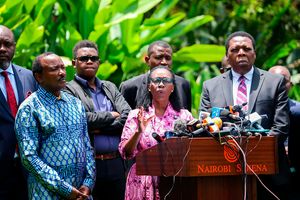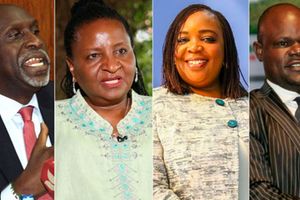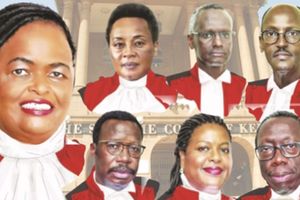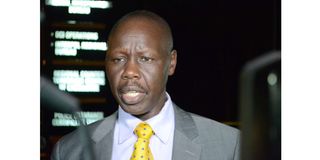
Lawyer Katwa Kigen during a past event. He told the ‘Nation’ in an interview that Deputy President William Ruto was not bothered by the surrender of ICC fugitive Paul Gicheru to the Hague-based court as the case against the DP had collapsed due to lack of evidence.
President William Ruto’s lawyer, Joseph Katwa Kigen, has revealed reasons why he skipped the ongoing interviews for the six members of the Independent Electoral and Boundaries Commission (IEBC), despite having been shortlisted by the panel.
The lawyer failed to appear before Nelson Makanda led Selection Panel on Thursday that is taking place in Nairobi South C area.
In a confirmation call with Nation.Africa, Mr Kigen reiterated that his move was well informed of the pressure surrounding the process, becoming the first candidate to withdraw from the ongoing interview that had attracted 105 candidates.
“I did not want pressure and too much focus on me; or my decisions being second guessed based on my associations,” Mr Kigen told Nation.Africa on phone.
“I (also) do not want feelings that I have been planted, again (because) of my associations.”
Mr Kigen had been scheduled to appear before Nelson Makanda led team on Thursday around 11am in quest to join the electoral body in preparation of the 2027 general elections.
But the lawyer was a no-show, with the panel saying he had sent a letter withdrawing his candidature.
According to the letter that was acquired by Nation.Africa, Mr Kigen, who is an advocate of the High Court of Kenya, had addressed the panel expressing his wish to withdraw from the interview.
'Unnecessary controversies'
In a letter that was received by the panel on April 4, 2025 through Joseph K. Kigen Katwa Advocate, he said that he was avoiding unnecessary controversies that might have unfolded by his appearance.
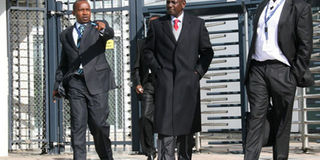
Then Senate Majority Leader Kindiki Kithure (left) Deputy President William Ruto (centre) and his lawyer Katwa Kigen at the Hague. File| Nation Media Group
“I refer to the shortlisting and attendant invite to appear for an interview on 10th April 2025 at 11.00 am for the position of a member of IEBC. Having reflected an inter-alia issues raised and to avoid unnecessary controversies over my candidature, I hereby write to withdraw my bid,” the letter reads.
Dr Makanda later told journalists that Mr Kigen had written to withdraw, and the panel had reorganized itself to interview candidates scheduled to appear on Friday, April 11, on Thursday.
Mr Kigen rose to prominence in the legal field when he took part in one of the high-profile cases at the International Criminal Court (ICC).
In the case that was later dismissed for lack of sufficient evidence, Mr Kigen represented President Ruto and Joshua Sang who were among the prominent 'Ocampo Six' who were accused of being perpetrators in the 2007 post -election violence.
He has, since then, represented President Ruto in various other cases, including the 2022 presidential election petition.
Former Kenyan ambassador to Germany Joseph Kipng'etich Magutt appeared before the panel within the time frame that Mr Kigen was supposed to appear.
Other candidates who were interviewed includes Joseph Kyavoa, Joyce Kemunto Nyabuti, former Kenya National Commission on Human Rights chairperson Kagwiria Mbogori, John Kilonzo Muthama and Jonathan Ltipalei Lodompui.
Among the topical issues that dominated the interview includes how to win back the trust of Kenyans to the electoral body and improving transparency in its operation.
Voter registration, awareness campaigns and the use of technology saw the candidates sharing ideas on how to arrive at it.

